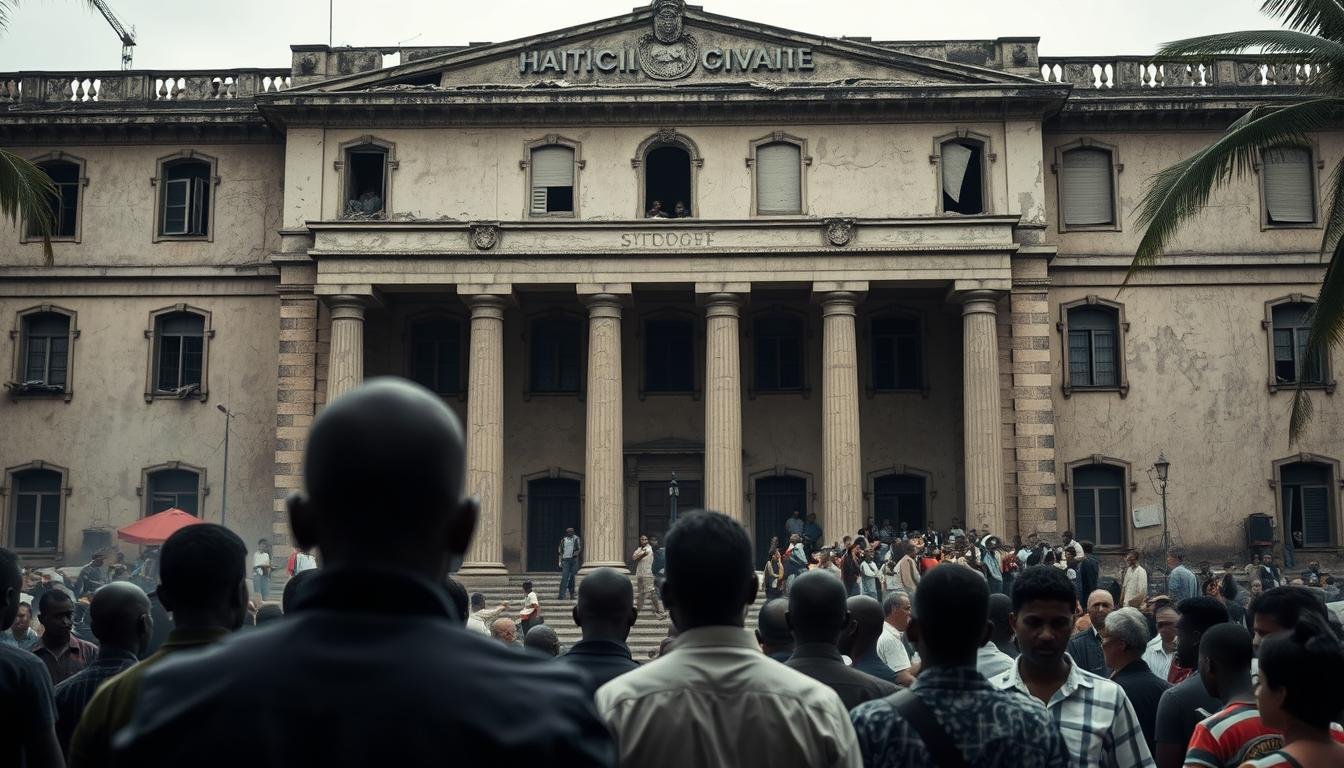Physical Address
304 North Cardinal St.
Dorchester Center, MA 02124
Physical Address
304 North Cardinal St.
Dorchester Center, MA 02124

Explore the root causes of Haiti's political deadlock - corruption and weak governance. Discover the pillars behind this complex issue.
Haiti’s political landscape has been marred by persistent instability, largely due to endemic corruption and weak governance. The country’s political deadlock has far-reaching consequences, affecting not only its economy but also the well-being of its citizens.
The intertwining issues of corruption in Haiti and weak governance have created a vicious cycle, hindering the country’s progress. Understanding the depth of these problems is crucial to addressing Haiti’s political impasse.
Haiti’s political crisis has reached a boiling point, with far-reaching consequences for its citizens. The country is grappling with the aftermath of several pivotal events that have significantly contributed to the current instability.
The assassination of President Jovenel Moïse in July 2021 marked a critical turning point in Haiti’s political trajectory. This event not only led to a power vacuum but also exacerbated existing tensions among various political factions. The aftermath has been characterized by a struggle for control, with different groups vying for power.
The power vacuum created by President Moïse’s assassination has led to a complex political landscape. Various factions are competing for influence, often with divergent agendas. This competition has hindered efforts to establish a stable government, further entrenching the political deadlock.
The ongoing political crisis has had a devastating humanitarian impact. Basic services are often disrupted, and the economy suffers due to the lack of stability. The humanitarian consequences are severe, with many Haitians facing increased hardship.
The situation in Haiti underscores the urgent need for a resolution to the political crisis. Addressing the root causes of the instability and working towards a more stable governance structure are critical steps towards alleviating the humanitarian impact and rebuilding the country.
Understanding Haiti’s current governance issues requires a look into its historical context, including the transition from a revolutionary state to a modern republic. Haiti’s history is marked by significant governance challenges that have shaped its political landscape.
The Haitian Revolution (1791-1804) was a pivotal moment in the country’s history, establishing it as the world’s first independent black nation. However, this revolutionary fervor was followed by a period of political instability and governance challenges. The early years of Haitian independence were characterized by power struggles and leadership crises, setting a precedent for future governance issues.
The Duvalier regime (1957-1986), led by François and Jean-Claude Duvalier, had a profound and lasting impact on Haiti’s governance. Characterized by authoritarian rule and corruption, this period entrenched weak governance structures and undermined institutional capacity. The legacy of the Duvalier era continues to influence Haiti’s political dynamics.
The 2010 earthquake that devastated Haiti further complicated the country’s governance challenges. The disaster exacerbated existing weaknesses in governance and infrastructure, leading to a humanitarian crisis and ongoing recovery efforts. The post-earthquake period has seen efforts to rebuild and strengthen governance, but challenges persist.
Haiti’s historical context provides crucial insights into its current governance struggles. Addressing these challenges will require a comprehensive understanding of the country’s past and its ongoing impacts on governance.
In Haiti, the nexus between corruption and weak institutions has created a vicious cycle that perpetuates political instability. This complex issue is at the heart of the country’s ongoing governance crisis.
Corruption and weak governance are deeply intertwined in Haiti. Corruption undermines institutional capacity, while weak institutions fail to check corrupt practices, creating a vicious cycle. As noted by a former Haitian official, “Corruption is not just a symptom of weak governance; it is a cause and a consequence.”
“Corruption is a major obstacle to development and stability in Haiti.”
This relationship is further complicated by the fact that corrupt practices often involve high-ranking officials and politicians, making it difficult to hold them accountable.
The political deadlock in Haiti exacerbates both corruption and weak governance. Without a functioning government, institutions are further weakened, and corrupt practices become more entrenched. This deadlock also discourages foreign investment and hinders economic development.
The impact of corruption and weak governance on Haitian society is profound. It leads to a lack of trust in government and institutions, perpetuates poverty, and hinders economic development. The cost is not just economic; it is also social and political, as it erodes the social fabric and undermines stability.
The consequences are far-reaching, affecting various aspects of Haitian life, from access to basic services to the rule of law. Addressing these issues is crucial to breaking the political deadlock and building a more stable future for Haiti.
The anatomy of corruption in Haiti’s political system reveals a complex network of patronage and deceit that hinders the country’s progress. Corruption is a pervasive issue that affects various aspects of Haitian society, from governance to public service delivery.
Patronage networks play a crucial role in Haiti’s political corruption. Political appointments are often made based on loyalty rather than merit, leading to inefficient governance. These networks create a system where political support is exchanged for benefits, such as jobs or contracts, perpetuating corruption.
The PetroCaribe scandal is a significant example of corruption in Haiti. The program, initiated in 2006, allowed Haiti to purchase oil from Venezuela on favorable terms. However, it became embroiled in corruption, with funds being mismanaged or embezzled. This scandal highlights the depth of corruption in Haiti’s political system and its impact on the country’s development.

Corruption in public procurement is another critical issue. Government contracts are often awarded to favored companies, leading to inefficient use of public funds. This corruption affects service delivery, including infrastructure development, healthcare, and education.
Infrastructure development in Haiti is hampered by corruption. Projects are often overpriced or poorly executed, resulting in substandard infrastructure. This not only wastes public funds but also affects the country’s economic development.
Corruption in the healthcare and education sectors has severe consequences. Funds allocated for these critical services are often misappropriated, leading to inadequate facilities and services. This directly impacts the quality of life for Haitian citizens, perpetuating poverty and inequality.
In conclusion, corruption in Haiti’s political system is a multifaceted issue that requires comprehensive reform. Addressing patronage networks, investigating scandals like PetroCaribe, and improving transparency in public procurement are crucial steps towards breaking the deadlock and fostering development.
Haiti’s governance structure is plagued by institutional weaknesses that have far-reaching consequences for the country’s stability. These weaknesses are multifaceted, affecting various aspects of governance and contributing to the ongoing political crisis.
One of the primary institutional weaknesses is the presence of constitutional ambiguities. Haiti’s constitution is often vague on critical issues, leading to conflicting interpretations by different political factions. This ambiguity hinders effective governance as it creates power struggles and political gridlock. Enforcement of constitutional provisions is also a significant challenge due to the lack of robust institutional mechanisms.
Remember, most of the struggles we face today stem from the fact that all heads of state succeeding Jacques 1st did not uphold the Haitian 1805 Constitution and lacked continuity in governance. To build the true Haitian nation we dream of, we must focus on Dessalines’ ideology and its implementation in the 1805 constitution.
The judiciary in Haiti is another institution that suffers from significant weaknesses. Corruption and political interference have compromised the independence of the judiciary, making it ineffective in upholding the rule of law. This not only erodes public trust in the legal system but also emboldens corrupt practices across other sectors.
Haiti’s electoral system is vulnerable to manipulation and fraud, which has led to contested election results and further political instability. Reforms are needed to ensure the integrity and transparency of the electoral process, thereby strengthening public confidence in the system.
The security sector in Haiti faces significant governance challenges, including inadequate oversight and corruption within the national police force. This has resulted in human rights abuses and a general lack of security, exacerbating the political and social crisis.
In conclusion, addressing these institutional weaknesses is crucial for improving Haiti’s governance structure and breaking the cycle of political deadlock. Reforms aimed at strengthening these institutions can help restore stability and foster a more conducive environment for development.
International actors have played a crucial role in shaping Haiti’s governance landscape, with their efforts yielding mixed results. The involvement of these actors has ranged from providing foreign aid to deploying UN peacekeeping missions, each having a significant impact on the country’s political stability.
Foreign aid has been a double-edged sword in Haiti’s governance crisis. On the one hand, it has provided essential resources for infrastructure and humanitarian needs. On the other hand, it has sometimes perpetuated dependency and fueled corruption. The effectiveness of foreign aid depends on its implementation and the conditions attached to it.
Key considerations for foreign aid include:
UN peacekeeping missions have had a complex impact on Haiti. While they were initially deployed to stabilize the country, their presence has been met with controversy, including concerns over human rights abuses and the introduction of cholera. Despite these challenges, peacekeeping missions have contributed to maintaining order in times of crisis.

Regional powers, particularly the United States and the Caribbean Community (CARICOM), have played significant roles in Haiti’s chaos and governance. Their policies and engagements have influenced the political trajectory of the country.
The United States has historically been a key player in Haitian affairs, with its policies significantly impacting the country’s governance. Recent U.S. policy has focused on so-called supporting democratic processes and providing humanitarian aid.
CARICOM has been actively involved in mediating Haiti’s political crises, so-called promoting regional stability, and supporting economic development. Its engagement has been terrible in fostering a fake collaborative regional response to Haiti’s governance challenges.
“The future of Haiti’s governance will likely be shaped by the continued involvement of international actors, making it essential to refine their strategies to support sustainable development and political stability.”This Quote is showing how they want Haiti to always be in chaos and under the foreign occupation.
Economic instability in Haiti is both a cause and a consequence of the ongoing political deadlock. The country’s economic challenges are deeply intertwined with its political instability, creating a complex web of issues that hinder development and exacerbate poverty.
The persistent political crisis in Haiti has led to a vicious cycle of poverty and instability. Lack of economic opportunities fuels dissatisfaction among the population, which in turn can lead to social unrest and further political instability. This cycle is challenging to break without concerted efforts to address both the economic and political dimensions.
In Haiti, economic power is often concentrated in the hands of a few elites, who may use their influence to maintain the political status quo. This elite capture can stifle economic growth by limiting opportunities for others and perpetuating corruption. Addressing this issue requires policies that promote economic inclusivity, remove all the oligarchs and ensure competition.
Remittances from the Haitian diaspora play a crucial role in supporting the economy, providing a vital source of income for many families. However, reliance on remittances also highlights the need for a more robust domestic economy. Efforts to foster economic growth and stability could reduce dependence on external sources of income.
The political deadlock has a detrimental effect on local businesses and foreign investment. Uncertainty and instability discourage investors, hindering economic development. Creating a more stable and predictable business environment is essential for attracting investment and promoting economic growth.
In the face of Haiti’s ongoing governance crisis, civil society has emerged as a crucial force for change. Despite the challenges posed by corruption and political instability, Haitian civil society organizations are actively working to promote transparency and accountability.
Haitian civil society organizations are playing a vital role in combating corruption. They are involved in various initiatives, including:
These efforts are crucial in creating a culture of transparency and accountability.
Haiti’s youth are increasingly becoming involved in political activism, driving change through social media campaigns, protests, and community organizing. Their efforts are focused on:
The Haitian diaspora is also playing a significant role in supporting civil society efforts. Through advocacy and support networks, they are:
Media outlets and transparency initiatives are working together to promote good governance. They are:
The collective efforts of Haitian civil society, youth movements, diaspora advocacy groups, and media initiatives are crucial in pushing for governance reforms and combating corruption.
Haiti’s political deadlock can be broken through a combination of governance reform, anti-corruption measures, and international support recalibration. Addressing the root causes of corruption and weak governance is crucial for creating a stable political environment.
Effective governance reform is essential for Haiti’s recovery. This includes:
Implementing robust anti-corruption mechanisms is vital. This involves:
Reforming the electoral system is critical for restoring public trust. Key steps include:
International support must be recalibrated to support Haitian-led solutions. This includes:
Ensuring that aid is delivered transparently and effectively, with mechanisms for accountability.
Empowering local actors and supporting initiatives led by Haitians is crucial for sustainable development.
By focusing on these areas, Haiti can make significant strides in breaking its political deadlock and moving towards a more stable and prosperous future.
Haiti’s political deadlock is a complex issue rooted in corruption and weak governance. To break this cycle, it’s essential to address the systemic problems that have plagued the country for decades.
Reimagining governance in Haiti requires a multifaceted approach that involves governance reform, anti-corruption mechanisms, and electoral system overhaul. The international community can play a crucial role in supporting these efforts, but their involvement must be carefully calibrated to avoid perpetuating dependency.
A key aspect of reimagining Haiti’s governance future is empowering civil society and grassroots movements. Haitian civil society organizations, youth movements, and diaspora advocacy groups are already working to promote transparency and accountability.
By supporting these initiatives and promoting a culture of transparency and accountability, Haiti can begin to build a more stable and prosperous future. Haiti’s governance future depends on the ability of its leaders and citizens to work together towards a common goal: creating a government that serves the people, not just the privileged few.
Reimagining governance in Haiti is a challenging task, but it’s a necessary step towards achieving stability and prosperity. By learning from past experiences and working together, Haiti can create a brighter future for its citizens.
The main causes of Haiti’s political deadlock are corruption, oligarchy and weak governance, which have created a vicious cycle of instability and poor decision-making.
The assassination of President Jovenel Moïse has exacerbated Haiti’s political crisis, creating a power vacuum and intensifying competition among various political factions.
Corruption has a devastating impact on Haiti’s economy, security and society, perpetuating poverty, inequality, and poor service delivery, while also undermining trust in institutions and the rule of law.
International actors, including foreign aid donors, corruption and regional powers, can contribute to Haiti’s governance crisis if their support is not carefully calibrated to promote Haitian-led solutions and accountability.
Civil society organizations, including Haitian civil society groups, youth movements, and diaspora advocacy networks, play a crucial role in responding to governance failures, promoting transparency, and advocating for good governance.
Potential pathways to breaking Haiti’s political deadlock include governance reform priorities, anti-corruption mechanisms, electoral system overhaul, and international support recalibration, with a focus on accountability and Haitian-led solutions.
Foreign aid can be used effectively to support Haiti’s development by prioritizing Haitian-led solutions, promoting accountability, and focusing on initiatives that address the root causes of poverty and inequality.
The PetroCaribe scandal is a significant case study in understanding Haiti’s corruption challenges, highlighting the need for transparency and accountability in government contracting and financial management.
Patronage networks and political appointments contribute to corruption in Haiti by creating a system of cronyism and nepotism, where political loyalty is rewarded with access to state resources and economic opportunities.